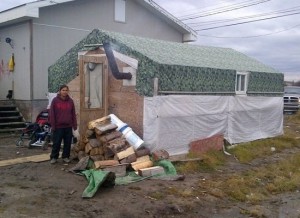 THUNDER BAY – The United Nations Special Rapporteur on the rights of indigenous peoples, James Anaya, issued the following statement in light of the serious situation of the Attawapiskat First Nation, a remote community in northern Ontario, Canada, as well as the alleged generally poor living conditions in aboriginal reserves in the country.
THUNDER BAY – The United Nations Special Rapporteur on the rights of indigenous peoples, James Anaya, issued the following statement in light of the serious situation of the Attawapiskat First Nation, a remote community in northern Ontario, Canada, as well as the alleged generally poor living conditions in aboriginal reserves in the country.
20 December 2011
“I have been in communication with the Government of Canada to express my deep concern about the dire social and economic condition of the Attawapiskat First Nation, which exemplifies the conditions of many aboriginal communities in the country.
Many of this First Nation’s approximately 1,800 members live in unheated shacks or trailers, with no running water. The problem is particularly serious as winter approaches in the remote northern area where the Attawapiskat community lives, which faces winter temperatures as low as -28 degrees Celsius.
The federal Government has recently agreed to provide emergency housing in Attawapiskat to address the crisis situation, placing the community under third party management to oversee spending, as a condition to receiving such housing assistance. However, band members, including the band chief, have denounced the third party management regime, asserting that they are better equipped to respond to the needs of their community than a third party manager.
The social and economic situation of the Attawapiskat seems to represent the condition of many First Nation communities living on reserves throughout Canada, which is allegedly akin to third world conditions. Yet, this situation is not representative of non-Aboriginal communities in Canada, a country with overall human rights indicators scoring among the top of all countries of the world. Aboriginal communities face vastly higher poverty rights, and poorer health, education and employment rates as compared to non-Aboriginal people.
According to the information received, First Nations communities are systematically underfunded as compared to non-Aboriginal towns and cities. This unequal funding is allegedly rooted in various funding formulas and policies used by Indian and Northern Affairs Canada to allocate funds to First Nations to support various social and economic programs.
Reportedly, systematic underfunding of First Nations exacerbates their already diminished capacity to attend to the social and economic interests of their members. Further, it not does it appear that the Government is responding adequately to requests for assistance.
Moreover, the Government has allegedly been resisting efforts by the Canadian Human Rights Commission to inquire into allegations of discrimination on the basis of national or ethnic origin related to disparities in funding provided to First Nations as compared to non-aboriginal communities, inquiries that have been requested by First Nations themselves.
In a communication sent to the Canadian authorities on 19 December 2011, I asked the Government to express its views about the accuracy of this information, and requested further details regarding official programs currently in place to address the disparate social and economic conditions of First Nations communities, as compared to non-Aboriginal communities, as well as the disparate social and economic conditions between and among First Nation communities.
As the United Nations Special Rapporteur on the rights of indigenous peoples I will be monitoring closely the situation of the Attawapiskat First Nation and other aboriginal communities in Canada, keeping an open dialogue with the Government and all stakeholders to promote good practices, including new laws, government programs, and constructive agreements between indigenous peoples and states, and to implement international standards concerning the rights of indigenous peoples.”
S. James Anaya
Special Rapporteur
On 26 March 2008, the United Nations Human Rights Council appointed S. James Anaya Special Rapporteur on the rights of indigenous peoples for an initial period of three years. The Council renewed his mandate for an additional three years in 2011. Mr. Anaya is a Regents Professor and the James J. Lenoir Professor of Human Rights Law and Policy at the University of Arizona (United States).
